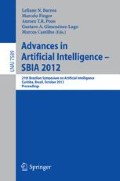Abstract
Defeasible Logic Programming (DeLP) is a formalism able to represent incomplete and potentially contradictory information that combines logic programming with defeasible argumentation. In the past few years, this formalism has been applied to real world scenarios with encouraging results. Not withstanding, the outcome one may obtain in this or any other argumentative system is directly related to the decisions (or lack thereof) made during the phase of knowledge representation. In addition, this is exacerbated by the usual lack of a formal methodology able to assist the knowledge engineer during this critical phase.
In this article, we propose a formal methodology for knowledge representation in DeLP, that defines a set of guidelines to be used during this phase. Our methodology results in an key tool to improve DeLP’s applicability to concrete domains.
Access this chapter
Tax calculation will be finalised at checkout
Purchases are for personal use only
Preview
Unable to display preview. Download preview PDF.
References
Baral, C.: Knowledge representation, reasoning and declarative problem solving. Cambridge University Press (2003)
Baral, C., Gelfond, M.: Logic programming and knowledge representation. Journal of Logic Programming 1(19-20), 73–148 (1994)
Bondarenko, A., Dung, P.M., Kowalski, R.A., Toni, F.: An abstract, argumentation-theoretic approach to default reasoning. Artificial Intelligence 93(1-2), 63–101 (1997)
Capobianco, M., Chesñevar, C.I., Simari, G.R.: Argumentation and the Dynamics of Warranted Beliefs in Changing Environments. Journal of Autonomous Agents and Multiagent Systems 11, 127–151 (2005)
Chesñevar, C., Maguitman, A., González, M.P.: Empowering recommendation technologies through argumentation. In: Argumentation in Artificial Intelligence. Springer (2010)
Chesñevar, C., Maguitman, A., Simari, G.: Argument-based critics and recommenders: A qualitative perspective on user support systems. Data & Knowledge Engineering 59(2), 293–319 (2006)
García, A.J., Simari, G.R.: Defeasible Logic Programming: An Argumentative Approach. Theory and Practice of Logic Programming 4(1), 95–138 (2004)
Gelfond, M., Leone, N.: Logic programming and knowledge representation - the a-prolog perspective. Artificial Intelligence 1-2(138), 3–38 (2002)
Gelfond, M., Lifschitz, V.: Logic Programs with Classical Negation. In: Warren, D.H.D., Szeredi, P. (eds.) Proceedings of the 7th International Conference on Logic Programming, pp. 579–597 (1990)
Newell, A., Simon, H.: Computer Science as Empirical Inquiry. In: ACM Turing Award Lectures, pp. 287–387. Addison-Wesley (1987)
Nute, D.: Defeasible Reasoning. In: Proceedings of the XX Annual Hawaii International Conference on System Sciences, pp. 470–477 (1987)
Simari, G.R., Loui, R.P.: A Mathematical Treatment of Defeasible Reasoning and its Implementation. Artificial Intelligence 53(1–2), 125–157 (1992)
Stankevicius, A.G., Simari, G.R.: A Methodology for Knowledge Representation in Defeasible Logic Programming. In: Proceedings del 12vo Congreso Argentino de Ciencias de la Computación (CACiC), pp. 1139–1150. Universidad Nacional de San Luis, San Luis (2006)
Author information
Authors and Affiliations
Editor information
Editors and Affiliations
Rights and permissions
Copyright information
© 2012 Springer-Verlag Berlin Heidelberg
About this paper
Cite this paper
Stankevicius, A.G., Capobianco, M. (2012). On the Development of a Formal Methodology for Knowledge Representation in Defeasible Logic Programming. In: Barros, L.N., Finger, M., Pozo, A.T., Gimenénez-Lugo, G.A., Castilho, M. (eds) Advances in Artificial Intelligence - SBIA 2012. SBIA 2012. Lecture Notes in Computer Science(), vol 7589. Springer, Berlin, Heidelberg. https://doi.org/10.1007/978-3-642-34459-6_1
Download citation
DOI: https://doi.org/10.1007/978-3-642-34459-6_1
Publisher Name: Springer, Berlin, Heidelberg
Print ISBN: 978-3-642-34458-9
Online ISBN: 978-3-642-34459-6
eBook Packages: Computer ScienceComputer Science (R0)

